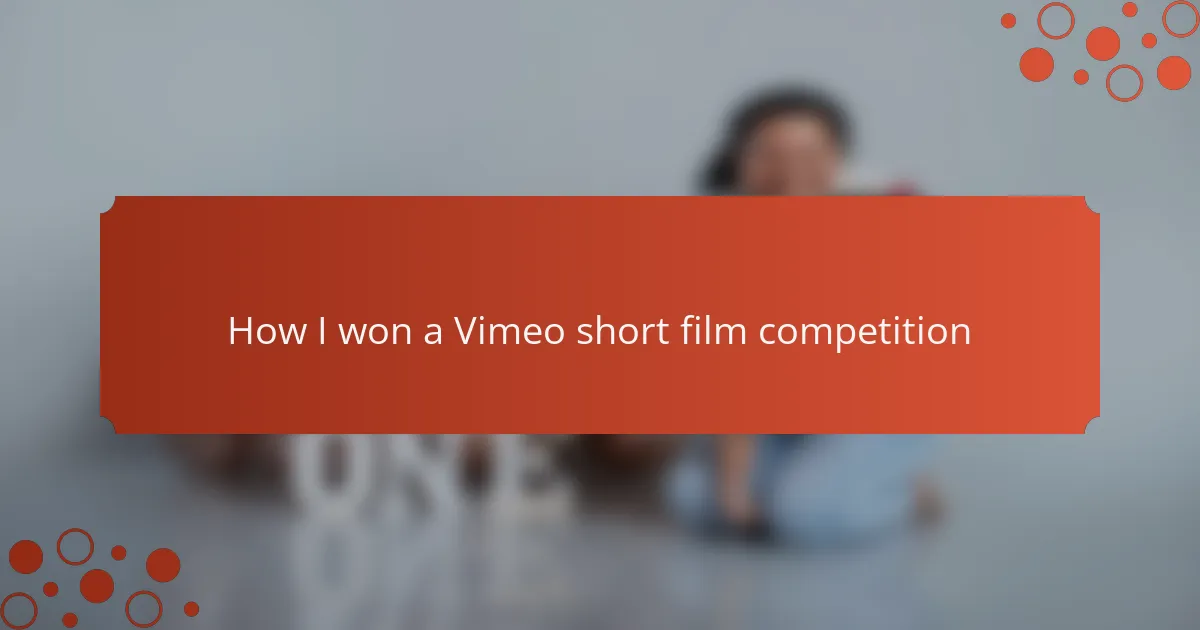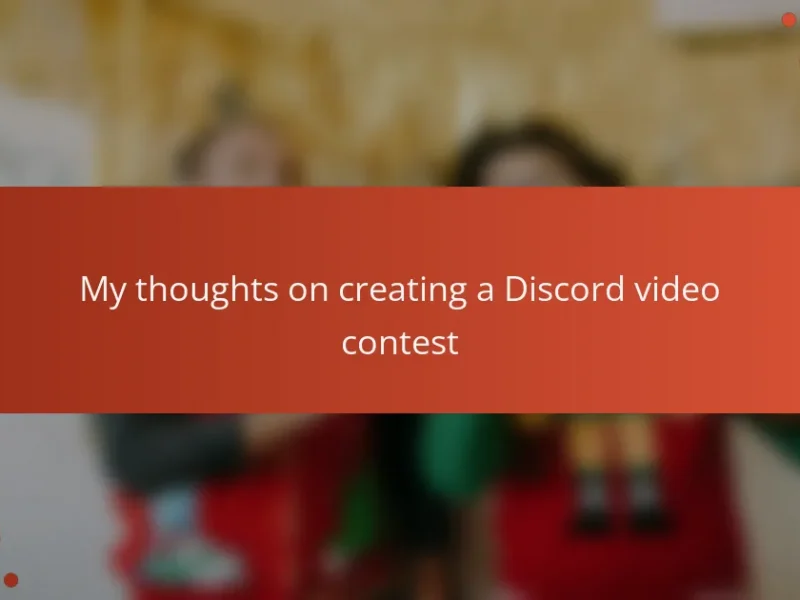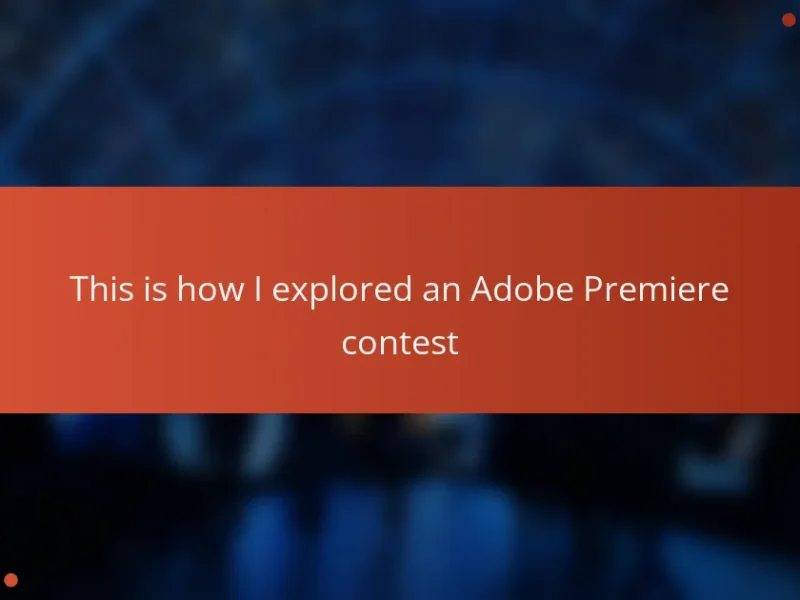Key takeaways
- Vimeo short film contests foster a supportive community that encourages creativity and feedback, aiding filmmakers in growth.
- Preparation is crucial; meticulous editing, technical details, and adherence to submission guidelines can greatly impact success.
- Winning films feature strong emotional connections, originality, and technical finesse, enhancing viewer engagement.
- Embrace feedback, be patient in editing, and allow time for experimentation to create impactful and memorable films.
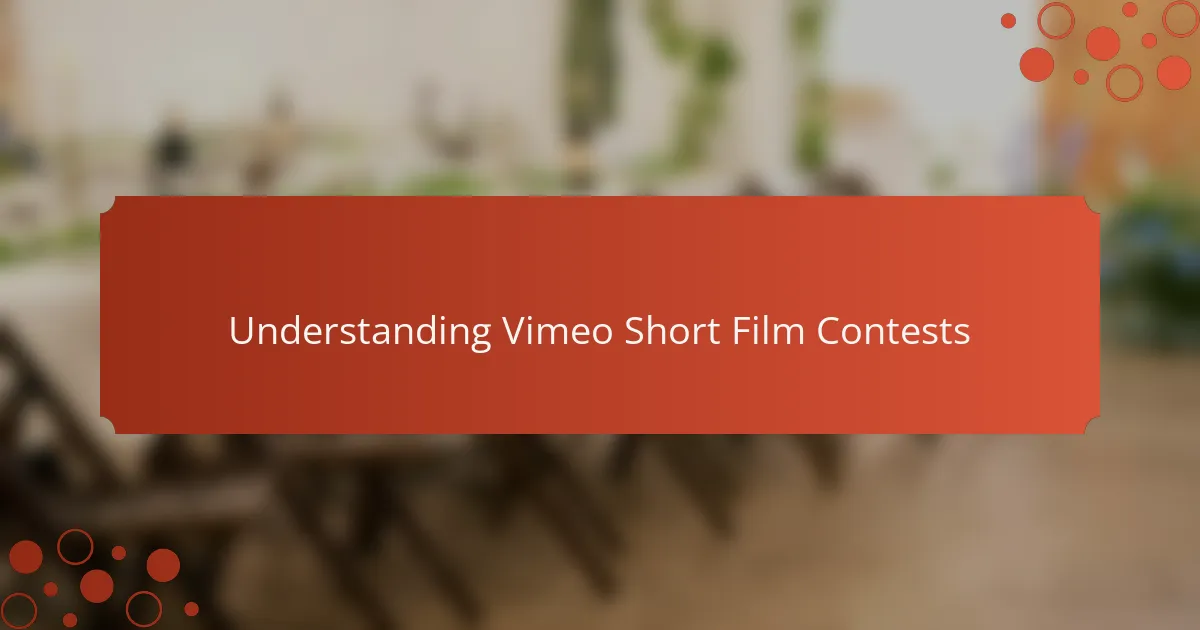
Understanding Vimeo Short Film Contests
Vimeo short film contests are not just about showcasing creativity—they challenge you to tell a compelling story within a tight timeframe. I remember feeling both excited and anxious when I first entered one; the pressure to make every second count is real. Have you ever thought about how much impact can be packed into just a few minutes?
What makes these contests unique is Vimeo’s community-driven approach. Filmmakers, both amateur and professional, come together to inspire and critique, creating an environment that fosters growth. It’s like being part of a creative family where feedback is honest but always encouraging, which truly helped me refine my craft.
Another thing I noticed is the diversity of themes and genres welcomed in these contests. Whether it’s drama, comedy, or experimental film, Vimeo’s platform encourages you to push boundaries. That freedom allowed me to experiment with storytelling methods I’d never tried before, and it made the whole competition feel like an exciting playground rather than just a contest.
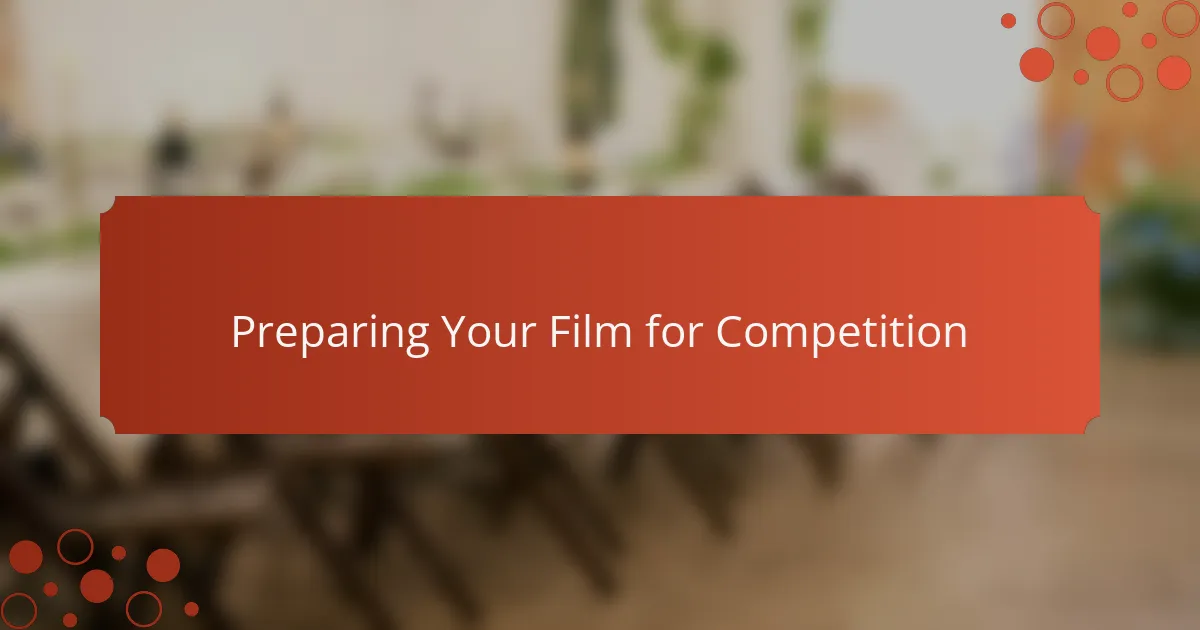
Preparing Your Film for Competition
Preparing your film for competition is where the real work begins. I found that once my idea was solid, the next step was meticulous editing—cutting anything that didn’t serve the story was tough but essential. Have you ever struggled to decide what stays and what goes, knowing every second matters?
Beyond trimming footage, I paid close attention to technical details like sound quality and color correction. These might seem minor, but I learned the hard way that a distracting audio hiss or inconsistent lighting can pull judges out of the experience. It felt like polishing a gem—you want it to shine from every angle.
Finally, I always double-checked the competition rules and submission guidelines. Missed formats or late uploads can disqualify even the best films, and I wasn’t about to let that happen. Would you believe that after all the creative effort, the most frustrating part could be something as simple as file size? That’s why preparation isn’t just creative—it’s strategic.
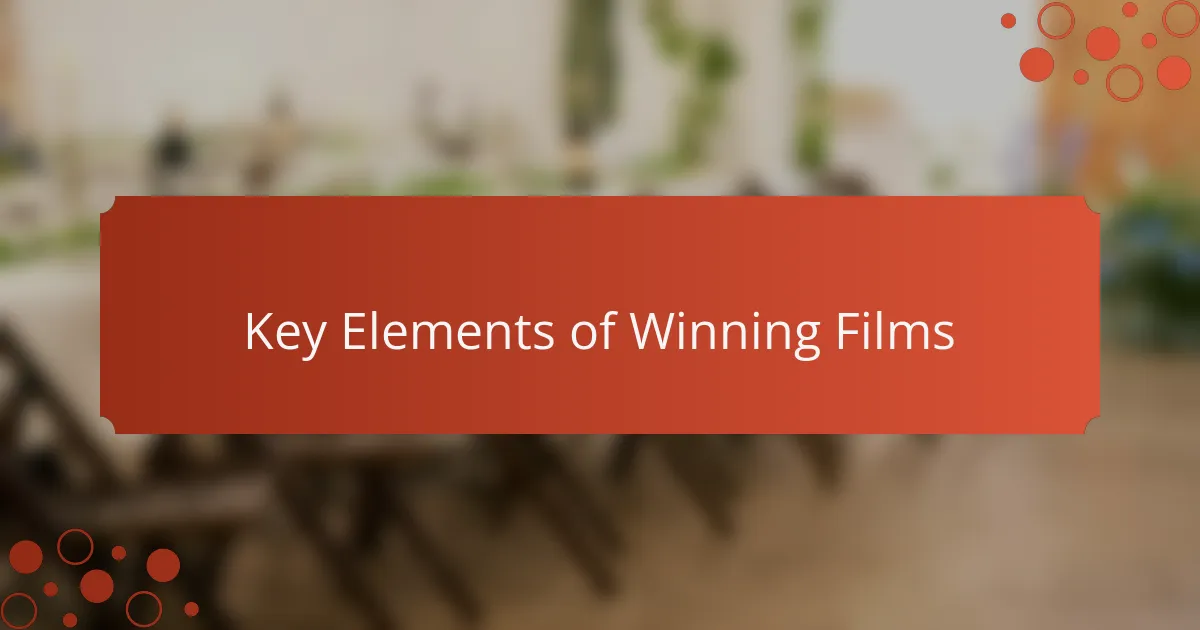
Key Elements of Winning Films
Winning films always have a strong emotional core that pulls you in right from the start. When I think back, the films that stood out to me had characters or stories I could relate to instantly—something that made me care deeply, even in just a few minutes. Have you ever watched a short film and found yourself completely immersed? That’s the magic of connection.
Another crucial element is originality. I learned that judges appreciate films that take creative risks or offer a fresh perspective. It’s not about flashy effects or big budgets; it’s about telling a story that feels authentic and surprising. When I crafted my winning film, I focused on a unique angle that no one else was exploring, and that made all the difference.
Lastly, technical finesse can’t be overlooked. Crisp visuals, clear sound, and smooth editing create a seamless experience that keeps viewers engaged. I’ve seen films with great stories falter because of shaky camera work or muffled dialogue, and that stuck with me. Paying attention to these details may seem tedious, but it truly elevates your film from good to unforgettable.
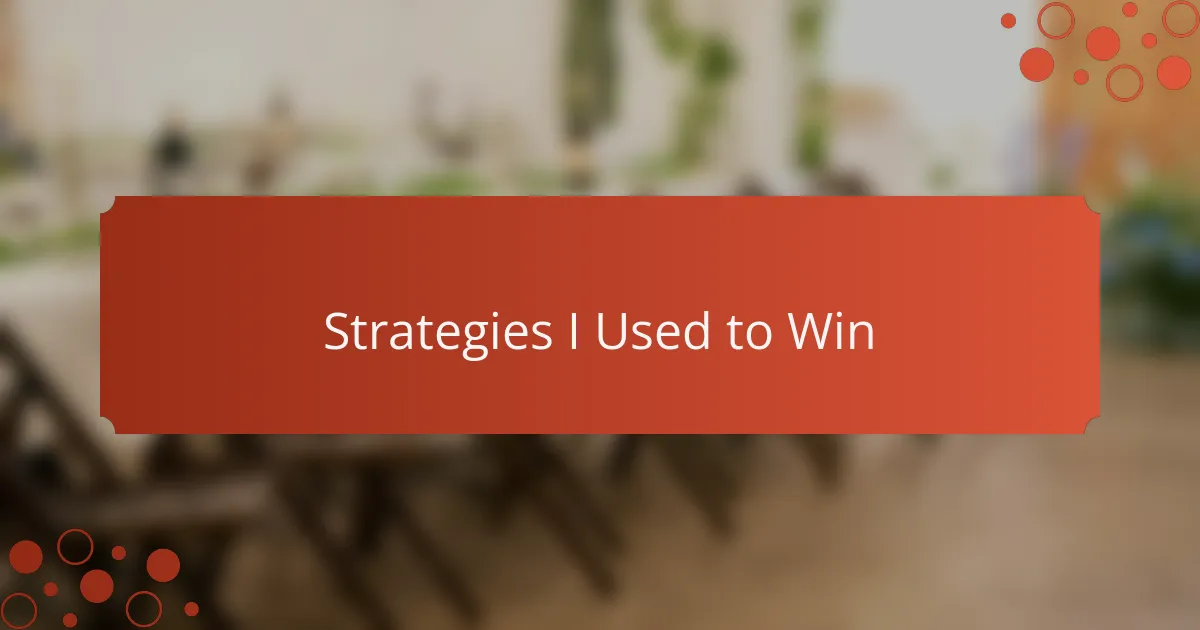
Strategies I Used to Win
One strategy I relied on was immersing myself deeply in the Vimeo community before submitting my film. I spent time watching past winners and commenting thoughtfully on others’ entries. This not only helped me understand what resonated with judges and audiences but also sparked ideas for my own storytelling approach. Have you ever noticed how being part of a community can sharpen your creative instincts?
I also made it a point to test my film on different devices and screens. I wanted to be sure the emotional beats hit just right, whether viewed on a phone or a laptop. Because, honestly, nothing feels worse than realizing your carefully crafted scene looks or sounds off on someone else’s device. This attention to detail gave me confidence that my film’s impact would be consistent, no matter how judges watched it.
Lastly, I struck a careful balance between following the rules and pushing creative boundaries. I kept the theme and technical requirements front and center but wasn’t afraid to take risks with pacing and visual style. This combination made my entry stand out while still ticking all the boxes—something I think is crucial if you want to catch judges’ attention quickly and effectively. Have you ever played it too safe and wondered if that cost you the win?
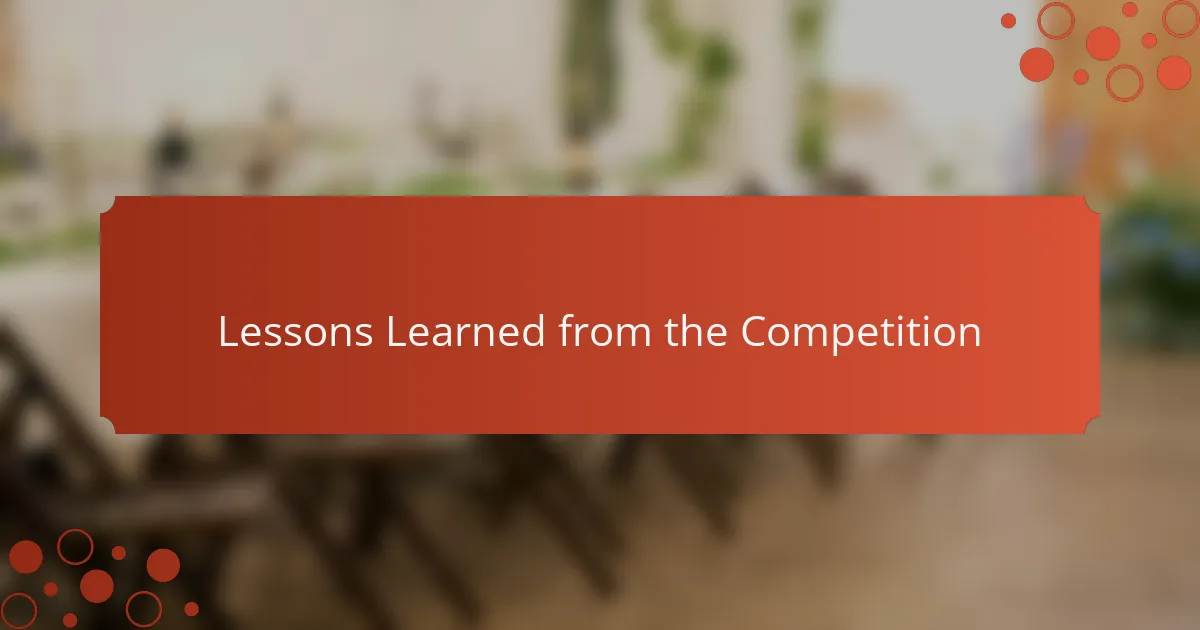
Lessons Learned from the Competition
One lesson that really stuck with me was the importance of patience during the editing process. I found myself going back over the same scenes repeatedly, questioning what truly served the story and what was just filler. Have you ever been caught in that cycle? It taught me that sometimes, less really is more when every second counts.
Another insight was how crucial it is to embrace feedback—even when it stings a little. Early on, I hesitated to share my film with others, fearing negative criticism. But when I finally did, the constructive comments helped me polish aspects I hadn’t even noticed. That experience made me realize that competition isn’t just about winning; it’s about growing as a storyteller.
Lastly, I learned that resilience pays off in unexpected ways. There were moments when I doubted if my film was strong enough, or if I’d meet the deadlines. Pushing through those doubts taught me a lot about perseverance. Have you ever surprised yourself by finishing something you weren’t sure you could? That feeling made the eventual win all the more rewarding.
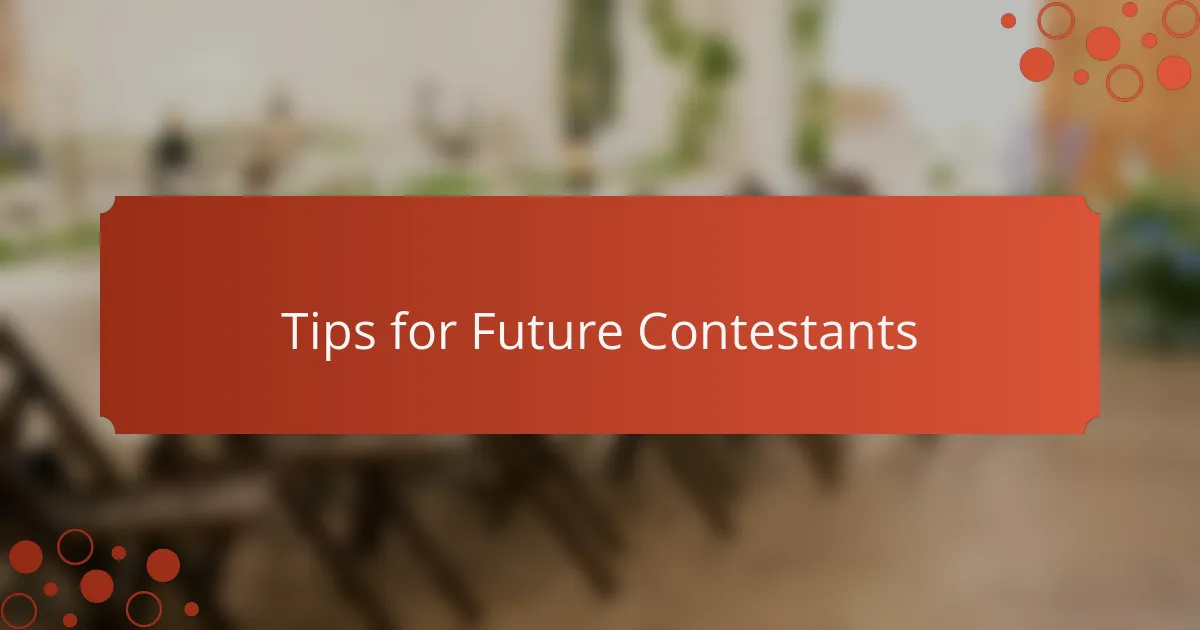
Tips for Future Contestants
One tip I always share is to start early and give yourself plenty of time to experiment. I remember rushing my first entry and wishing I’d allowed more time to try different ideas. Have you ever felt that last-minute pressure dull your creativity? Giving yourself room to explore can make all the difference.
Don’t underestimate the power of feedback. When I first showed my rough cut to a few trusted friends, their insights opened my eyes to issues I hadn’t noticed. It can be tough to hear criticism, but isn’t improving worth that small discomfort? Sharing your work early will help you shape a stronger final film.
Lastly, keep your audience in mind, especially the judges who watch dozens of entries. I learned that clear storytelling—without unnecessary complexity—makes your film more memorable. Have you ever been drawn into a story just because it was simple and sincere? That kind of connection is your secret weapon in competition.
